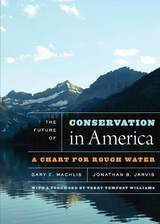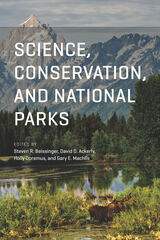5 books about Machlis, Gary E.

The Future of Conservation in America
A Chart for Rough Water
Gary E. Machlis and Jonathan B. Jarvis
University of Chicago Press, 2018
This is a turbulent time for the conservation of America’s natural and cultural heritage. From the current assaults on environmental protection to the threats of climate change, biodiversity loss, and disparity of environmental justice, the challenges facing the conservation movement are both immediate and long term. In this time of uncertainty, we need a clear and compelling guide for the future of conservation in America, a declaration to inspire the next generation of conservation leaders. This is that guide—what the authors describe as “a chart for rough water.”
Written by the first scientist appointed as science advisor to the director of the National Park Service and the eighteenth director of the National Park Service, this is a candid, passionate, and ultimately hopeful book. The authors describe a unified vision of conservation that binds nature protection, historical preservation, sustainability, public health, civil rights and social justice, and science into common cause—and offer real-world strategies for progress. To be read, pondered, debated, and often revisited, The Future of Conservation in America is destined to be a touchstone for the conservation movement in the decades ahead.
Written by the first scientist appointed as science advisor to the director of the National Park Service and the eighteenth director of the National Park Service, this is a candid, passionate, and ultimately hopeful book. The authors describe a unified vision of conservation that binds nature protection, historical preservation, sustainability, public health, civil rights and social justice, and science into common cause—and offer real-world strategies for progress. To be read, pondered, debated, and often revisited, The Future of Conservation in America is destined to be a touchstone for the conservation movement in the decades ahead.
[more]

National Parks and Rural Development
Practice And Policy In The United States
Edited by Gary E. Machlis and Donald R. Field; Foreword by Senator Craig Thomas
Island Press, 2000
Protecting land in parks is often seen as coming at the expense of rural economic development. Yet recent events such as the contentious debate over the development of Canyon Forest Village on the south rim of the Grand Canyon suggest just the opposite: healthy natural systems can be enormously valuable to rural economies.National Parks and Rural Development offers a thorough examination of the interdependent roles of national parks and the economies of rural communities in the United States. Bringing together the thinking and views of economists, historians, sociologists, recreation researchers, and park managers, the book considers how those roles can be most effectively managed, as it offers: a wide-ranging review of history and important concepts in rural development and parks management five case studies of rural development near national parks that identify lessons learned, principles applied, mistakes committed, and advances made personal essays from leaders in the parks management field For each section, the editors offer introductory discussions that provide context and highlight key points. The editors also provide a detailed conclusion which summarizes policy implications and presents specific recommendations for improving rural development and park management policies.Case studies include: Cape Cod National Seashore, Alaskan parks and wilderness areas, Yellowstone National Park, the Grand Canyon, and three parks in the Pacific Northwest (Mt. Rainier, Olympic, and North Cascades).ational Parks and Rural Development is a unique synthesis and guide to solving conflicts between the needs of human communities and nature near federal lands. It will be an important work for agency personnel, nongovernmental organizations, and students and scholars of rural economic development, public policy, environmental economics, and related fields.
[more]

On Interpretation
Sociology for Interpreters of Natural and Cultural
Gary E. Machlis
Oregon State University Press, 1992

Science, Conservation, and National Parks
Edited by Steven R. Beissinger, David D. Ackerly, Holly Doremus, and Gary E. Machlis
University of Chicago Press, 2016
As the US National Park Service marks its centennial in 2016, parks and protected areas worldwide are under increasing threat from a variety of factors, including storms and fires of greater severity, plant and animal extinctions, the changing attitudes of a public that has become more urbanized, and the political pressures of narrow special interest groups. In the face of such rapid environmental and cultural changes, Science, Conservation, and National Parks gathers a group of renowned scholars—including Edward O. Wilson, Jane Lubchenco, Thomas Dietz, and Monica Turner, among many others—who seek to address these problems and, in so doing, to secure a future for protected areas that will push forward the frontiers of biological, physical, and social science in and for parks.
Examining the major challenges of parks and protected areas throughout the world, contributors provide answers to a number of key conservation questions, such as: How should stewardship address climate change, urban encroachment and pollution, and invasive species? How can society, especially youth, become more engaged with nature and parks, and are there models to guide interactions between parks and their neighbors? What are appropriate conservation objectives for parks in the Anthropocene? Charting a course for the parks of the next century, Science, Conservation, and National Parks is certain not only to catalyze the continued evolution of US park conservation policy, but also to be an inspiration for parks, conservation, and management worldwide.
Examining the major challenges of parks and protected areas throughout the world, contributors provide answers to a number of key conservation questions, such as: How should stewardship address climate change, urban encroachment and pollution, and invasive species? How can society, especially youth, become more engaged with nature and parks, and are there models to guide interactions between parks and their neighbors? What are appropriate conservation objectives for parks in the Anthropocene? Charting a course for the parks of the next century, Science, Conservation, and National Parks is certain not only to catalyze the continued evolution of US park conservation policy, but also to be an inspiration for parks, conservation, and management worldwide.
[more]

Sustainability for the Forgotten
Gary E. Machlis
University of Utah Press, 2024
Opening with the extraordinary story of a young French priest working in 1968 amongst impoverished villages of northeast Brazil, struggling to bring sustenance, sustainability, and hope to these disregarded and willfully ignored communities, this book asks a broad and far-reaching question that challenges the contemporary sustainability movement: What about sustainability for the forgotten?
Sustainability for the Forgotten is an incendiary book that confronts the history, policies, and practices of sustainability. It interrogates the usefulness of current sustainability approaches for the poorest of the poor, the chronic underclass, victims of natural disasters, refugees, the oppressed, and asks, how can we do better? With examples that range from the coffeelands of El Salvador to the coal country of American Appalachia, from the streets of Detroit to refugee camps in Greece and the upscale metro centers of the affluent, sustainability is examined with a critical eye and with an emphasis on insuring that the forgotten are heard.
At once well-researched and passionate, wide-ranging and sharply focused, Sustainability for the Forgotten is unlike any other book on the sustainability movement. Written with a distinctive voice that is reasoned, unflinching, and often poetic, the book challenges the sustainability movement to follow "a just and necessary path." The result is a provocative statement on the future of sustainability and a call to action that is ultimately hopeful.
Sustainability for the Forgotten is an incendiary book that confronts the history, policies, and practices of sustainability. It interrogates the usefulness of current sustainability approaches for the poorest of the poor, the chronic underclass, victims of natural disasters, refugees, the oppressed, and asks, how can we do better? With examples that range from the coffeelands of El Salvador to the coal country of American Appalachia, from the streets of Detroit to refugee camps in Greece and the upscale metro centers of the affluent, sustainability is examined with a critical eye and with an emphasis on insuring that the forgotten are heard.
At once well-researched and passionate, wide-ranging and sharply focused, Sustainability for the Forgotten is unlike any other book on the sustainability movement. Written with a distinctive voice that is reasoned, unflinching, and often poetic, the book challenges the sustainability movement to follow "a just and necessary path." The result is a provocative statement on the future of sustainability and a call to action that is ultimately hopeful.
[more]
READERS
Browse our collection.
PUBLISHERS
See BiblioVault's publisher services.
STUDENT SERVICES
Files for college accessibility offices.
UChicago Accessibility Resources
home | accessibility | search | about | contact us
BiblioVault ® 2001 - 2024
The University of Chicago Press









